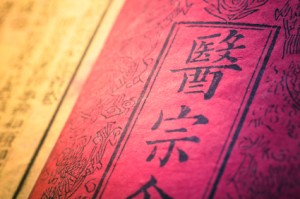Click on acupuncture in the tag cloud and you’ll know that I’ve spent a number of years examining and sharing information about important studies on this blog. In some, acupuncture has been shown to alleviate vasomotor symptoms like hot flashes and night sweats, and in others, acupuncture appears to be no better than placebo or sham needles that are placed on accurate points but not actually inserted into the skin. However, I’ve also long argued that by slightly changing the way that we conduct scientific studies in the West and allowing for individualization, observed benefits might be different. Indeed, that’s exactly what researchers have seen with ACUFLASH and you can read more about that trial here.
Less clear that whether or not acupuncture can help symptoms (for the record, I am biased and I believe that over time it can), is HOW it works. The centuries old Chinese medicine paradigm is never so apparent than with acupuncture and although I am not sure why we need to know the ‘how,’ I am fairly certain that until it is revealed, there will be a lot of researchers and health practitioners questioning its validity or utility.
So, this brings me to a wonderful pilot study in the online version of Menopause, exploring that very question: how does acupuncture work on vasomotor symptoms?
In this small trial, 33 perimenopausal and postmenopausal received traditional acupuncture, sham acupuncture or nothing over a period of 12 weeks. The active groups received three treatments per week and all the women reported having at least 7 hot flashes a day. But there’s the rub: the researchers also looked at how traditional acupuncture affected the hypothalamic-pituitary axis (HPA), the part of the body that comprises the hypothalamus and pituitary and adrenal glands, controls digestion, our immune system, mood and emotions, sexuality, and how energy is used and stored. Moreover, this part of the body reacts quite negatively to stress by releasing a hormone known as cortisol. Not surprisingly, women who have very severe vasomotor symptoms tend to produce high levels of cortisol.
What did they learn?
- Most of the benefits, (e.g. reductions in hot flashes) occurred by week five and; hot flash severity and frequency declined by 86% and 78%, respectively in both the real acupuncture and sham acupuncture groups. But while the sham acupuncture group didn’t continue to improve, the real acupuncture group did.
- Likewise, anxiety and depression improved in both of these groups, as did sleep scores.
And the “how?”
It appears, at least from this small study, that acupuncture positively affected levels of cortisol and DHEA, the major steroid secreted by the adrenal glands that affects none other than the body’s production of estrogen. Consequently, if acupuncture helps to control the HPA, and HPA affects vasomotor symptoms, then perhaps scientists have the first clue as to why acupuncture may help certain menopausal symptoms. It also opens up an entirely new avenue for novel strategies to control them.
The bottom line is that there is hope and a new direction that researchers will ideally follow. Ultimately, acupuncture may prove to be even more effective than pharmaceutical strategies for menopausal symptoms and definitely, much safer.
The jury’s still out but it seems a helluva closer to a verdict.







